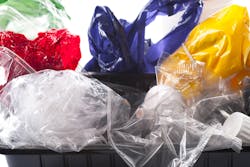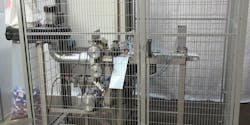Why the U.S. Packaging Industry Faces Environmental Challenges
Inventor Ernest Neckhaim of FuTech Solution GmbH explains why sustainable packaging can only be a partial solution and why much of the recycling problem takes place far from the end-user business within the manufacturing industry itself.
With his unpacking machine called Skinner, the Austrian inventor is helping well-known companies such as Manner to work more sustainably while improving their balance sheet at the same time.
The Covid crisis is once again enormously exacerbating the environmental problems of the packaging industry because simultaneously the US demand for packaging has also exploded. Packaged groceries and rising e-commerce demand are making their mark on plastic filling and protective materials.
Plastic packaging is making a devastating comeback in the pandemic, with the production of packaging plastics expected to increase up to six percent in the U.S. by the end of 2021. This is where the sustainability problem becomes apparent because it is also possible to act more sustainable, knows Ernest Neckhaim. He views the throwaway mentality of the packaging industry as a fatal trend, because a large part of the recycling potential is not on the consumer side, but in production itself: Namely, in defective goods that are unsuitable for sale and end up—along with their packaging—in the residual waste.
"Even most of the modern, more sustainable materials shouldn’t be disposed of in organic waste, because they contain plastic components, for example," says Lukas Neckhaim Co-Founder of FuTech Solution GmbH, explaining the food industry's dilemma. "In order to recycle broken goods in an environmentally friendly way, they must first be unpacked."
But the process is a laborious one. Either it is carried out manually in costly procedures—or, even more problematic, the defective products are instead disposed of unpacked as hazardous waste in exchange for a corresponding recycling fee. This puts a strain on the environmental balance sheet and is becoming increasingly difficult to reconcile with stricter legislation.
To help companies, work more sustainably and at the same time improve their profitability, the two founders developed a machine that automates the unpacking process of broken goods and enables complete recycling of all components.
Sustainable Production Increases Profitability
The machine, known as a "Skinner," uses rollers and vacuum pumps to pull packages off the product. The empty packages are then collected in a container attached to the machine. The production process does not have to be interrupted in the process: Broken goods ejected from the production line can be fed directly into the Skinner via assembly line connection and ejection is also automated. Furthermore, detectors can first check the foodstuffs discharged by the Skinner for packaging residues before they are subsequently crushed by roller systems or similar equipment and can be reused. Thus, at the same time, the Skinner also allows all organic materials to be directly reused, reducing the throwaway rate to zero.
The Skinner operates at a cycle rate of fewer than four seconds and with only a few fine adjustments the machine's apparatus can be adapted to products from different manufacturers and different packaging materials. The machine's economic range of use spans all products between two and 250 grams. A study to investigate the profitability of the Skinner demonstrated that a return on investment is already achieved less than one year after purchase. At the Austrian confectionery producer Manner, it had been as little as four months.
Your browser does not support the video tag or the file format of this video. https://www.webestools.com/Application in the Meat Processing Industry: Integrating a "Skinner" into the Production Line
Currently, test runs are being carried out with a well-known ham manufacturer from Germany in which the packaged frozen ham parts are unpacked with the Skinner and then further processed in the production process. Compared to the previous use case, in this situation, the company will fully integrate the machine into the company’s production process.
"The first tests were very successful and promising so we are currently in negotiations with the customer for the installation of the first system," Ernest Neckhaim is pleased to announce.


